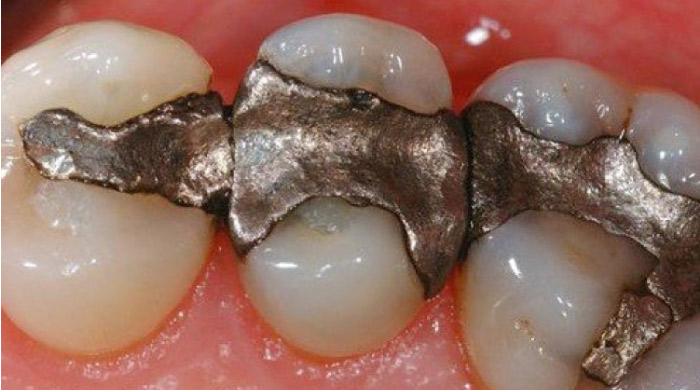Are Metal Tooth Fillings Dangerous to My Health?

When you have a cavity, it will need to be treated with a tooth filling. Because cavities are holes, a filling literally “fills in” the area where the decay created a space. Dental fillings are also used to treat worn down, broken, or cracked teeth. They can be put on front and back teeth. For years, fillings were all made with metal. Is that dangerous to your health?
Types of Metal Fillings
There are a few types of metal fillings. Amalgam, which is a combination of metals like elemental mercury, silver, tin, and copper alloy, has been used for over 150 years. These have a silver appearance. Gold is also used as a filling material, though it’s more expensive. Are these metals dangerous? Possibly. There is no scientific consensus that metal fillings cause harm, but there’s a possibility because of their ingredients. The mercury in amalgam concerns a lot of people and while the quantity of mercury in fillings is very low, you could be at an increased risk if you have multiple fillings and are exposed to mercury in other ways.
At Dental Solutions of Avon, We Use Composite Fillings
We know a lot of patients would rather not risk it with metal fillings, so we use biocompatible, composite fillings. Composite fillings are made of resin. Our fillings are non-toxic and free from potentially harmful materials. The added benefit is that these fillings blend in with your natural teeth!
When we put in a tooth filling, we first apply a topical anesthetic to numb the area. We then remove any decay and put in the filling. Before you go, we’ll be sure your bite feels normal and comfortable. You should wait 1-3 hours until the numbness has worn off before chewing or drinking a hot beverage. It’s also a good idea to eat softer foods for the rest of the day.
Need a Cavity Filled?
If you don’t want metal fillings in your mouth, come and see us to have a cavity filled. To avoid cavities altogether, keep up a good oral hygiene routine at home and visit us twice a year for preventative care!
Contact UsCategorised in: Oral Health, Oral Hygiene, Preventive Dentistry
